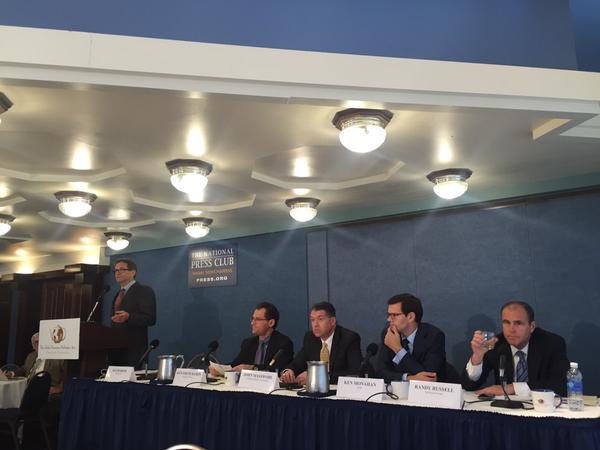COOL retaliatory tariffs could cost the United States $10 billion in the first year.

The message was clear during a panel discussion hosted by the National Pork Producers Council and the Global Business Dialogue Inc. on Capitol Hill, the U.S. country-of-origin labeling must be repealed immediately before harmful economic penalties do damage to the U.S. economy and more specifically the U.S. pork industry.
When the World Trade Organization Appellate Body ruled for the fourth and final time against the U.S.’s mandatory COOL, the warnings became reality and opened the legal pathway for Canada and Mexico to enact on promises to issue retaliation in a form of substantial tariffs on U.S. agriculture and non-agriculture products.
For years, Canada and Mexico had claimed that COOL disrupts its integrated marketplace. In addition, the USDA has acknowledged that COOL has no economic benefit to consumer and creates significant costs in regards to labeling requirements for meat products.
Trading partners' viewpoint
From the Canadian perspective, John Masswohl, director of international relations for the Canadian Cattlemen’s Association, says “We are ready for this issue to be fixed – to put it mildly - but an important thing to keep in mind is we are not desperate. We want the right fix.”
Furthermore, Masswohl explains this issue has been a seven-year battle costing Canadian hog and cattle producers over three 3 billion Canadian dollars per year on legal fees and advocacy. Therefore, Canada is not seeking a compromise solution or negotiation. Kenneth Smith Ramos from the Embassy of Mexico and Masswohl clearly state the repeal of COOL is the only clean solution. Both countries will be forced to retaliate if it gets to the point that Congress does not repeal COOL.
Frankly, Masswohl says “the segregation of livestock must end.” Requiring tracking an animal from birth to plate is not only expensive to U.S. livestock producers but it is also devalues Canadian and Mexican meat products.
Last week, the House of Representatives overwhelmingly passed H.R. 3293, legislation to repeal COOL requirements for beef, pork and chicken.
As H.R. 3293 moves on to the other chamber, some Senators are proposing a middle ground. Masswohl warns “If the Senate thinks there is a middle path on this, that is a very risky strategy.”
On the table of discussion in the Senate are alternative labeling options. These suggestions include North American labels with U.S.-origin options which still create segregation of livestock and WTO non-compliant or generic North American label, which gives no useful information for the consumer. Either case does not resolve the WTO decisions.
“There is no silver bullet, no magic solutions and there is no third way,” says Randy Russell, former chief of staff to U.S. Secretary of Agriculture. “There does not appear to be any other option to resolve this case. Ultimately the cost of segregation and the economics behind it must be addressed.”
Time is ticking
Time is of the essence as all parties are expecting that Canada and Mexico will be authorized to place the retaliatory tariffs on U.S. products as early as August.
Tomorrow (June 17), the United States’ two largest trading partners – Canada and Mexico - will officially request the WTO authorization to retaliate. Canada will be requesting $3 billion per year and Mexico will now be requesting $730 million, a correction from the previous announced $653 million - making this one of the largest retaliation amounts recorded.
“Retaliation is a COOL tax on U.S. goods. Once retaliation begins it represents a tax of billions of dollars on U.S. products on agriculture and non-agriculture that we export to our two biggest customers,” Russell says.
If approved by the WTO at a meeting scheduled for June 17, the retaliation tariffs could revert back to May 2013. As result, Russell says in the first year's price tag will actually be $10 billion.
The broad list of agriculture and non-agriculture products in line for tariffs proposed by Canada is designed to attract attention, Masswohl notes. Mexico has yet to release its list.
Once retaliatory levels are established, the burden of proof shifts to the United States. The retaliation will stay in place until Canada, Mexico and the WTO are all satisfied, Russell explains.
Still, Ken Monahan, director of International Trade Policy for the National Association of Manufacturers, says even before retaliation policy is in place the United States will lose sales as it did in the past with the Mexican cross-border trucking dispute. “America’s exporters need Congress to act now to prevent the loss of potential billions in exports, not months in the future.”
About the Author(s)
You May Also Like



